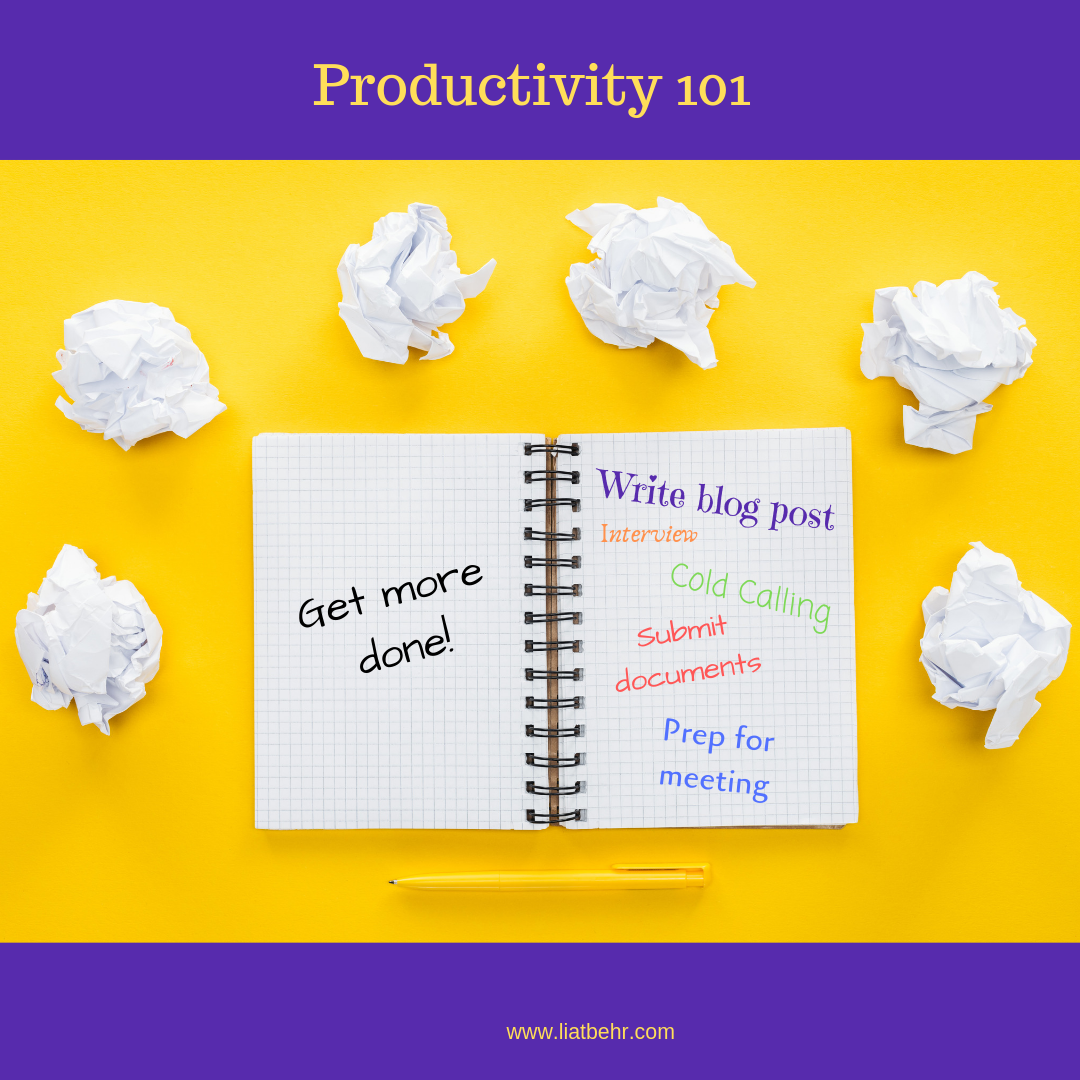So it’s been a while, but I’ve finally gotten back on social media. The reason I left in the first place was because it was such a time suck – I’d get on Facebook and before I knew it, an hour or two of my day were gone. And then I would curse myself.
Bad news. And not a good way to run a business.
But taking a break until I figured out a way to come back has proven invaluable. And my trick these days has been to limit the amount of time I spend on the various platforms. So today, I’ll get on for a maximum of thirty minutes (I time myself), which is enough time to produce a post. If posting takes less time, I give myself the space to browse and comment on other accounts and in groups.
And that’s when I came across a Facebook post on productivity by Tehila Gabai Deutsch. And it’s her tips and insights I want to share with you, here.
Firstly, Tehila points out that from research she’s conducted:
among women freelancers who work from home, 70% want to know how they can be more efficient.
I’m not surprised. There are only 24 hours in a day, and there’s constantly more pressure on us to do more in less time.
Lucky for us, Tehila put together an amazing post with lots of productivity tips and with her permission, I’m sharing them here.
1. Create a list of things you’re going to get done and take your list seriously
Tehila start work at 8:30am and works until 13:45, there are exceptions, she says, but for the most part she sticks to consistent work hours.
2. If non-work calls come in during regular work hours, ask them if you can get back to them
If Tehila receives a phone call during her work hours, she opts to call them back after 2pm, so as to not let it interfere with her work or throw her off track. The same goes for non-work meetings – she doesn’t schedule any non-work meetings during the morning and instead makes sure that precious work time is spent working.
3. Have a morning routine, a daily routine, and a task list. Make sure you prioritize which tasks are most important.
A morning ritual may be the key to starting off your day right and helping you be more productive. If there’s a task that I’m particularly anxious about and it’s playing with my head to the extent that I can’t focus, I’ll start with writing morning pages to help me figure out the right course of action and develop the confidence, then I’ll just do it and knock it out of the way. Starting with a small victory in the morning can help breed more victory throughout the day.
4. Experiment to find out which hours work best for you – much of this will have to do with whether you’re a morning person or night owl
Tehila used to squander her time on Facebook, reading the news, and watching cat videos. But after she realized that she’s at her best during the first two hours of the day, she became vigilant about getting the most out of them.
Tehila’s morning routine consists of reviewing urgent emails, WhatsApp and Facebook messages, and approving posts in the Facebook group she manages. Once she’s done with that, she starts working on her most important tasks on her list.
5. Prioritizing
So how does Tehila decide what’s most important? Every morning she makes a list of the most important things that she needs to finish that day, and in the next few days; she lists them on a piece of paper and carries them out in the order they’re listed.
While I also write down all my tasks, I do things a bit differently. For one, I make a list at the beginning of the week of all the things I need to get done. Then, in the same notebook, I make a daily plan for each day – and I make the plan at night, before I shut down. Next , I prioritize tasks by writing down the order in which I should do them (a small red number beside each task – number one for the first task and so forth). The next morning, I’m ready to jump in to my tasks, having prepped my mind in advance.
6. Know thyself
Tehila recommends asking yourself some questions that will help you figure out how you can be more effective. Thinking about what distracts you can help you figure out if something like music will be conducive to your work environment or not. And this goes back to the point on experimenting. You may not know the answers to all the questions you ask yourself. If that’s the case, don’t panic. Experiment, until you figure it out.
7. Tasks that don’t require a lot of brain power should be saved for times you don’t have all that much brain power to give
At some point or points during the day you’ll have an energy dip. Tehila recommends that during those times you should try to do things that don’t require a lot of brain power. For Tehila that means managing Facebook pages, which is one of the things she does for her clients. Seeing which people have liked a certain post and inviting them to like a page, doesn’t require all that much.
Sometimes being productive demands choosing a task based on how you feel.
8. What do you do when you can’t concentrate?
When Tehila studied at Open University she was taught that if a certain task (that’s not supposed to take long) takes more than 10 minutes, skip it and come back to it later. If this happens to you, Tehila recommends taking a small break, eating something and then continuing.
9. Social media – get in and get out as fast as you can
Tehila recommends never leaving Facebook open if you don’t need it for work. Before going into Facebook she reminds herself of the task she’s working on. She gets in, does the task and gets out. And she doesn’t go into it first thing in the morning, because that just causes her to keep visiting throughout the day without any real purpose. Tehila points out that deleting the Facebook app from the phone helps a lot of people, so does using a social media app add blocker. She also mentions the idea of logging out of Facebook and re-entering your name and password every time you want to go back in. That can help make you more aware of going in and maybe even prevent it.
10. Don’t underestimate how much you can get done in 15 minutes or half an hour
Think about the time you have, not about the time you don’t have. If you have limited time to get something done, sit down and do it – 15 minutes or a half an hour may be enough. And even if it’s not enough time to complete it, it may be enough time to make a dent in it.
11. Your work environment affects the quality of your work
Tehila points out that research suggests that we’re much more inclined to sit down and get our work done if our work space is more pleasant and inviting than if it’s not. So while that doesn’t mean that you need to hang up inspirational quotes in every corner, it does mean that your desk and computer should be comfortable to work on. Tehila shares that she has a very comfortable work chair, a vital tool for anybody who sits on a chair for hours at a time. And with regard to a computer, she says, make sure it works fast and well and doesn’t act up. Tehila works with two screens which makes her life much easier. She recommends adding a second screen if you can – “you won’t believe how much faster you’ll work!” she says.
12. Storing your great ideas
Many times ideas come out of nowhere and when you least expect them. Tehila uses Telegram to create her custom list of great ideas but says that WhatsApp can also be used. Creating a list is one way to make sure that you can safekeep your ideas and return to them when you’re ready.
I don’t use Telegram, instead I have my different notebooks for various projects and add my new ideas into the relevant project notebook. This helps me because my ideas for my different project are all organized in the places it makes sense for them to be and are pretty easy to find. For instance, I divided up my blogging notebook into different sections – in one section I add inspirational ideas and in another, blog post ideas. I know where to look, depending on what I need.
13. Outsourcing
Tehila has just begun outsourcing when she feels that she’s not effective at something, and this has really helped her.
I agree that outsourcing could be a great way to leverage productivity. I have also just recently begun to do this, but for tasks that should require less of my time. I haven’t yet mastered this, but I’m certainly working on getting there.
Becoming more productive will help you accomplish more and meet more of your goals. It’s important to keep in mind that as with more things business, there are no hard and fast rules, no silver bullet and no wrong or right. Productivity is a matter of trial and error and figuring out what’s best for you. I suggest experimenting. If you are willing to be curious about how you can do things faster and better, you’ll find the way.
Good luck!
Once again, special thank you to Tehila Gabai Deutsch for her Facebook post which was originally posted on her Hebrew blog.
Do you have a productivity tip that works really well for you? Please share in the comments below.


